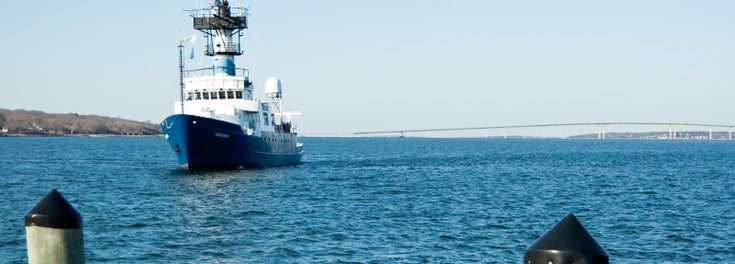Sure, we’ve got modern classrooms and high-tech laboratories and engaging lecture halls where students can learn about just about any topic imaginable. But learning about some subjects, like marine science, can be enhanced when taught in a floating classroom with access to the latest oceanographic instruments and the capability to traverse the world’s oceans. And we’ve got that, too.
The R/V Endeavor, based at the URI Narragansett Bay Campus, is a 185-foot research vessel that has taken thousands of scientists and students on more than 500 research expeditions throughout the Atlantic and Pacific Oceans, to the Mediterranean and Black Seas, and even to the Arctic. Students at the Graduate School of Oceanography are regular members of the science team aboard Endeavor, but there are plenty of opportunities for undergraduates to go to sea as well.
One ocean ecology class journeyed 110-miles south to the edge of the continental shelf last year as part of a summer class taught by Professor Brad Seibel. The students went scuba diving to collect specimens, trawled for fish as deep as 1,800-meters, and conducted measurements of the physical characteristics of the water column.
“This experience just caused my love for the ocean and marine life to grow immensely,” said Jillon McGreal, a senior marine biology major, who enjoyed pulling in the nets and working with the ship’s crew. “Because of this class I was able to make stronger connections with people in the professional marine biology world, and it became more clear to me that I want to continue on to graduate school to do research.”
Another group of students spent Spring Break last year aboard Endeavor studying plankton in the Gulf of Maine with Professor Susanne Menden-Deuer. They collected plankton samples at various depths at six sites around George’s Bank and conducted experiments in an on-board incubator.
Despite occasional high seas and rough weather, recent graduate Emily Bishop said there is no better way to test your skills as a marine scientist than to go to sea. “Basic laboratory skills, like looking through a microscope without getting nauseous, become 10 times harder on a ship,” she said.
And senior microbiology major Victoria Fulfer said her favorite part of the expedition was simply standing on deck while deploying instruments and seeing nothing but the vast ocean.
“I learned that I love being out in the ocean on a ship, even in rough conditions,” she said. “There’s nothing better than sleeping with the swaying of the ship. And I gained so much experience with techniques and instruments that I could never get from a normal lecture or lab course.”
Students also have opportunities to occasionally join expeditions aboard research vessels operated by other institutions, and URI has several smaller boats that allow students in ocean engineering, marine affairs, fisheries, oceanography and other disciplines to learn and conduct research in Narragansett Bay and nearby coastal waters.
“I learned a lot about pelagic ecology aboard Endeavor,” said Jillon, “but the whole process of going on a research cruise was invaluable.”

